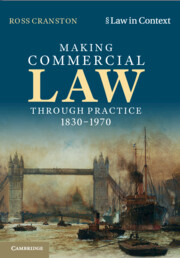Book contents
- Making Commercial Law Through Practice, 1830–1970
- The Law in Context Series
- Making Commercial Law Through Practice, 1830–1970
- Copyright page
- Dedication
- Contents
- Figures
- Preface
- Note on Terms and Archives
- Table of Cases
- Table of Legislation
- 1 Commercial and Legal Contexts
- 2 The Commodity Markets of London and Liverpool
- 3 Agents, ‘Agents’ and Agency
- 4 Sale, Hire and the Distribution of Manufactured Goods
- 5 International Commodity Sales
- 6 Bank Finance for Trade and Industry
- Index
3 - Agents, ‘Agents’ and Agency
Published online by Cambridge University Press: 14 May 2021
- Making Commercial Law Through Practice, 1830–1970
- The Law in Context Series
- Making Commercial Law Through Practice, 1830–1970
- Copyright page
- Dedication
- Contents
- Figures
- Preface
- Note on Terms and Archives
- Table of Cases
- Table of Legislation
- 1 Commercial and Legal Contexts
- 2 The Commodity Markets of London and Liverpool
- 3 Agents, ‘Agents’ and Agency
- 4 Sale, Hire and the Distribution of Manufactured Goods
- 5 International Commodity Sales
- 6 Bank Finance for Trade and Industry
- Index
Summary
Agents were crucial to the practice of international trade during the period covered by the book. They facilitated the import and export of goods, fixed shipping contracts, arranged insurance and conducted financial services for banks abroad. Agency patterns for goods changed and by about the middle of the nineteenth century sending goods to merchants abroad for sale on consignment was no longer as common as previously. For marketing reasons distributors of manufactured goods like motor vehicles were described as the ‘agents’ of manufacturers, but they were not true agents in law. Agents also came into their own in various parts of the world as so-called managing agents of plantations, mines and factories, and in the result became the fulcrum of powerful business groups. Through doctrines such as undisclosed principal and reasonable compliance with a principal’s instructions, and through devices such as the commission, del credere and confirming agent, the law went further in meeting commercial need. English law recognised that an agent should not always ‘drop out’ of the picture but should bear some responsibility for the underlying principal–third party contract if a transaction went wrong. The courts glossed over doctrinal difficulties to meet commercial need.
Keywords
- Type
- Chapter
- Information
- Making Commercial Law Through Practice 1830–1970Law as Backcloth, pp. 127 - 199Publisher: Cambridge University PressPrint publication year: 2021

